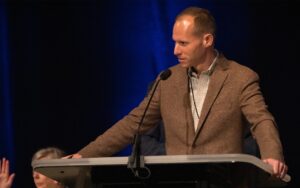
RICHMOND, Va. (BP)–Who said, “Conscience does make cowards of us all”? Answer: Hamlet, prince of Denmark, one of literature’s great procrastinators.
Who said, “Fatigue makes cowards of us all”? Vince Lombardi, one of football’s great coaches.
Who said, “Comfort makes cowards of us all”? Me, one of history’s great comfort seekers.
Comfort zones. I’m an expert on the subject. If you don’t believe me, ask my wife. There’s my beloved La-Z-Boy(r) chair, where I recline each evening, if I can chase the kids out of it. Got my favorite coffee (100 percent Colombian, extra strong) in my favorite cup, my newspaper (sports first, editorials last), my favorite music, my house, my car (with cruise control, one of civilization’s great achievements), my family, my friends.
We all have our comfort zones. The older we get, the more we develop. But even the youngest child craves order, boundaries, and security. Teens think they’re adventurous, but in truth are rigid conformists — desperately seeking acceptance by their peers.
Young adults leaving the comfort zones of school and family frantically search for something to replace them. Or they just stay in the nest: Nearly 40 percent of Americans ages 20-34 are living with a parent, according to the U.S. Census Bureau.
We cherish our comfort zones. We cling to them. They feel all warm and cozy and familiar — like that teddy bear you used to sleep with (or maybe still do). We are creatures of habit. Who can begrudge us a few harmless, comforting routines that make the old day-to-day bearable in this chaotic world?
“I just don’t feel comfortable with that.” How often have you said it? The discomfort you feel may be the voice of the Holy Spirit — warning you away from a questionable activity. Listen to that voice. If in doubt, don’t.
But if you’re being asked by God to do something new — to be something new — and your default response is “Lord, I just don’t feel comfortable with that,” then you need to rethink your concept of comfort.
Abram of old changed the course of history when he stepped out of his comfort zone. His father, Terah, had settled down with the family in Haran (Genesis 11:31). They sank their tent pegs there; when Terah died, Abram became head of the clan — respected, established, comfortable.
Then something happened: “Now the Lord said to Abram, ‘Go forth from your country, and from your relatives And from your father’s house, To the land which I will show you; and I will make you a great nation, And I will bless you … And in you all the families of the earth shall be blessed.’ So Abram went forth, as the Lord had spoken to him” (Genesis 12:1-4a, NASB).
The promise must have sounded good, but it’s hard to imagine what it took for Abram to leave his country, his relatives, his house. Kin and clan defined one’s identity in the Middle East — then and now. Yet Abram obeyed God — at the age of 75.
What if he hadn’t? There would have been no Isaac, for a son was part of God’s blessing in return for obedience. If no Isaac, no Jacob. If no Jacob, no Israel. If no Israel, no entry into the Promised Land. If no entry, no royal house of David. If no house of David, no human birth of Jesus the Messiah of Israel — and of the world.
God’s great plan of redemption required that one person take an initial step out of a comfort zone. That person was Abram. Genesis 12:1-4 is the first recorded missionary call in Scripture. God’s call and promise of blessing were “immediately followed by a purpose clause: ‘so that you may be a blessing,'” writes Walter Kaiser in “Israel’s Missionary Call.” “This man and his descendants were to be missionaries and channels of truth from the very beginning.”
This was Israel’s destiny as a light to the nations — and it is ours.
It’s not part of the church’s agenda; it is the agenda.
Is it your agenda? If you are comfortable — maybe a little too comfortable — remember that Jesus came to comfort the afflicted and to afflict the comfortable. What are your comfort zones? However harmless they may be, are they preventing you from obeying God and becoming a blessing to others?
The problem with comfort zones is that they give us far too much satisfaction. As the Christian writer William Law observed centuries ago: If you depend on God for only half of your happiness, you will love him with only half of your heart.
–30–
Erich Bridges is a senior writer for the Southern Baptist International Mission Board.















